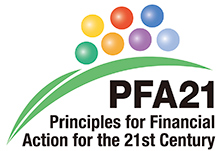KJRM (consisting of KJRM Holdings, KJR Management, and KJRM Private Solutions) participates in various initiatives to increase awareness of sustainability issues and promote efforts to address those issues.
Signed: June 2013 (First J-REIT asset manager)

PRI signatories are required to report annually on their responsible investment activities.
In the 2025 report, we received the following scores.
| Module | Score |
|---|---|
| Policy Governance and Strategy | ★★★★★ |
| Real estate | ★★★★★ |
| Confidence building measures | ★★★★☆ |
Signed: December 2022 (endorser) (First J-REIT asset manager)
The Advance was established by PRI, aims to make positive impacts on workers, communities and society by investors taking action on human rights and social issues.

Signed: June 2013

Signed: October 2016 (First J-REIT asset manager)

Principle 1: Businesses should support and respect the protection of internationally proclaimed human rights; and
Principle 2: make sure that they are not complicit in human rights abuses.
Principle 3: Businesses should uphold the freedom of association and the effective recognition of the right to collective bargaining;
Principle 4: the elimination of all forms of forced and compulsory labour;
Principle 5: the effective abolition of child labour; and
Principle 6: the elimination of discrimination in respect of employment and occupation.
Principle 7: Businesses should support a precautionary approach to environmental challenges;
Principle 8: undertake initiatives to promote greater environmental responsibility; and
Principle 9: encourage the development and diffusion of environmentally friendly technologies.
Principle 10: Businesses should work against corruption in all its forms, including extortion and bribery.
Participated: August 2019
TCFD was established in 2015 by the Financial Stability Board, which is composed of the central banks and financial regulatory authorities of major countries. In June 2017, in order to reduce risks associated with destabilizing financial markets, TCFD recommended that companies disclose business risks and opportunities presented by climate change in the medium to long term, along with the effects of these on financial conditions, as well as specific measures and strategies.
Statement in English
https://www.fsb-tcfd.org/wp-content/uploads/2017/06/FINAL-2017-TCFD-Report-11052018.pdf
Statement in Japanese translation
https://www.fsb-tcfd.org/wp-content/uploads/2017/06/TCFD_Final_Report_Japanese.pdf
Recognizing that climate change is an important environmental issue that significantly affects our business activities, we will aim to take measures in line with the TCFD framework.

We are committed to sustainability through the asset management business relating to the Investment Corporations. For details, please see the websites of Japan Metropolitan Fund Investment Corporation and Industrial & Infrastructure Fund Investment Corporation Investment.
Participated: May 2020 (Participated by KJRM)
The Japan Climate Initiative (JCI) was established in July 2018 as a network of Japanese companies, local governments, organizations, NGOs, etc. that are actively engaged in climate change countermeasures toward the realization of a decarbonized society aimed at by the Paris Agreement, as stated in the JCI declaration, “joining the front line of global trend for decarbonization from Japan.”

Participated:October 2023
